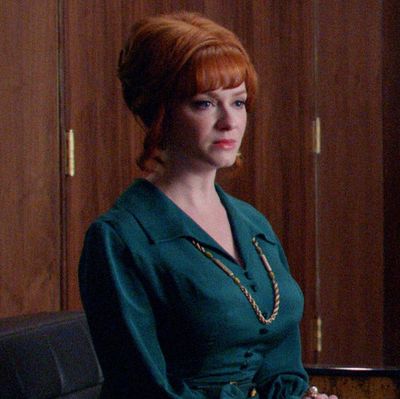
It’s plenty, Joan. That’s what Roger says. Half of what she’s earned at McCann Erickson is plenty — just take 50 cents for every dollar and agree that that’s enough to leave quietly. Plenty. What’s Joan worth, after all?
In “Lost Horizon,” we see Betty reading a Freud case about “hysteria” and everyone else telling Joan in various ways that she’s, well, hysterical. Can’t you just tolerate constant degradation and humiliation? Can’t you accept less money? Can’t you be pleased — or at least act pleased — that someone far less competent than you is going to be your boss? The book Betty is reading is Dora: An Analysis of a Case of Hysteria, and one of Dora’s presenting symptoms is aphonia, or “loss of voice.” Hmmm! One interpretation of Dora’s ostensible hysteria stems from the conflict between unconsciously enjoying the benefits of one’s objectification and the conscious distress of being part of such a broken social system. Sound familiar? “Lost Horizon” shows us, through Joan, exactly this torment.
Joan has faced sexual harassment her entire career — her entire adult life, probably — and when we meet her in 1960, she generally uses scuzzy male attention to her advantage. She even encourages Peggy to do the same, making sure to get in a few digs at Peggy’s looks, too. But we know Joan’s attitudes have changed, partially owing to changing cultural standards, partially owing to occupying a different place in society (being 40 is different than being 30), and a different place economically. Joan’s rich. There was a time in her life when she had to tolerate cretinous male behavior because it was synonymous with financial stability; see Dr. Greg the rapist for Exhibit A. More important than financial and political changes, though, is the change in the way Joan sees and thinks about herself.
Lots of Mad Men episodes retell or re-contextualize ideas from previous episodes, and aspects of “Lost Horizon” seem to shadow season five’s “The Other Woman,” which explores the way Joan experiences her own objectification. In the episode, Joan earns her partnership by being one of the savviest employees at Sterling Cooper, but she actually gets her partnership by having sex with Herb Rennet of Jaguar. In “Lost Horizon,” Jim Hobart wonders if Joan simply inherited the role. (Is one of those worse?) The partnership was in fact Lane Pryce’s idea, sort of to help Joan, but mostly to cover his own ass so no one would notice the accounting discrepancies he was responsible for. If it’s a decision Joan regrets, it doesn’t appear to be one she dwells on, and as Jim tells her in “Horizon,” “Your status has changed.” Indeed it has, but not the way Jim sees it. Joan didn’t sleep with Herb just for the money, or even mostly for the money: Joan slept with Herb because she was trying to redefine herself by mimicking aspects of the society she’s a part of, namely the SCDP folk. And it worked completely. She became a partner, and despite Harry’s sniping, an important one. Joan now has a status and identity she’s comfortable with — but she’s still part of a broken system.
One way oppressive systems stay oppressive is by habitually demonizing oppressed classes. In “Lost Horizon,” we see a conference room full of men instantly agree that the most off-putting idea to a man would be any kind of feminization: “diet” beer? Don’t say “calorie,” that’s for women, and women — bleh. Another way is by pathologizing resistance. By identifying behavior like Joan’s as “hysterical,” say. By depicting solidarity as “crazy” or alien or shameful or bad. Like when two female copywriters come to welcome Joan to the firm: They invite her out to drinks, but insist that it’s not a “women’s lib” gathering, and that they won’t be raising consciousness, ha-ha, don’t look at them askance, this is just a no-big-deal, happy-with-the-status-quo kind of gathering. Except of course it’s a women’s lib event, because women telling their own stories is a form of radicalism. One wonders what would have happened if Joan had gone to that happy hour.
Or if Shirley had had the chance to go with her. Advertising isn’t a comfortable place for everyone, she tells Roger, who until that very moment had probably not encountered that idea. Advertising in 1970 was not a comfortable place for women. It was not a comfortable place for people of color. And somehow it turned out not even to be a comfortable place for Don. It’s a comfortable place for Harry. Take the money and run, Joan.

